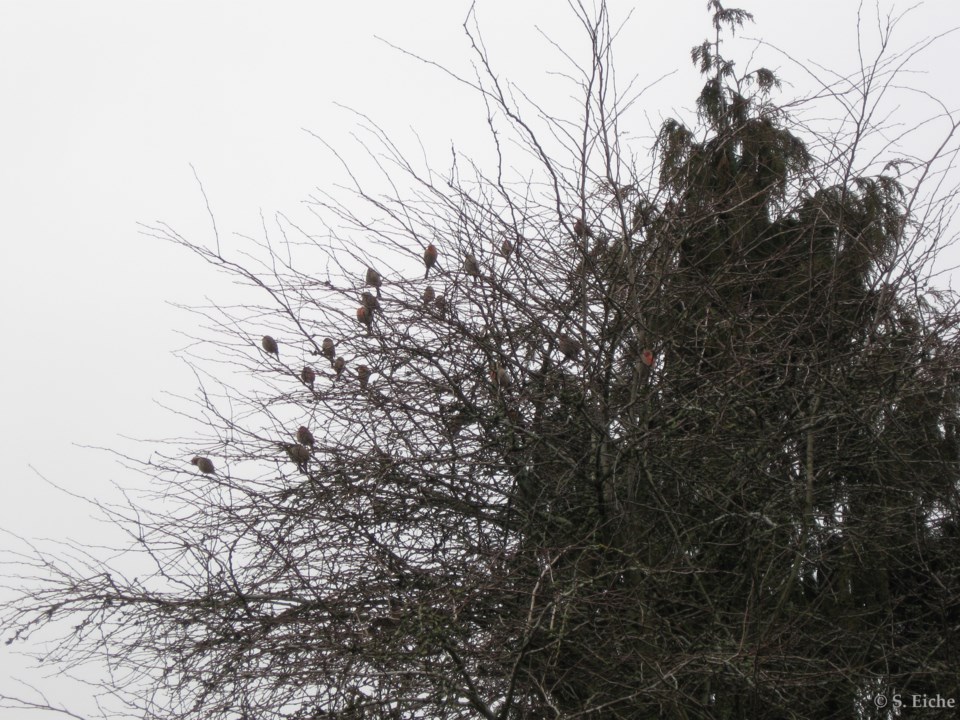I was gobsmacked when I heard about the effect the provincial government’s Bill 44 (passed in November 2023) would have on Richmond. It’s led to the rezoning of nearly 27,000 properties to allow multi-unit housing on single-family lots.
Take a look at the map to see where those 27,000 properties are. They’re mostly in the western part of Richmond, and they account for a huge number of lots that were first developed in the 1950s and 1960s.
Many of these older properties now have large trees – important not only for us human residents but also for the non-human residents, who far outnumber the humans. Many of the older lots have proper gardens (as opposed to the odd ornamental plant), and a few of them are even key biodiversity sites.
My neighbourhood is one of those affected by Bill 44. The street I live on has 15 single-family lots, with 11 still occupied by the original houses and four occupied by newly-built monster mansions. The original lots have a driveway leading to a carport or garage and ample open space all around the house. The monster mansions occupy nearly the total area of the lots. Most, if not all, of the space that’s left around the house is paved over. The result is that the monster mansions have pushed out the non-human residents who once called these lots home – the birds have no trees to sit or sleep in; there aren’t any leaves or other suitable vegetation on the ground where birds can find food and beneficial insects can procreate or overwinter; insects flying overhead immediately sense it’s a starvation zone. Their habitats have been destroyed.
Clearly, no additional dwellings can be built on lots occupied by monster mansions. So, what about the other lots? Is it justified to destroy even more of our environment by building additional dwellings on these properties? And what other consequences are there?
Well, here’s what happened on our street. Recently, one house from the 1960s was not torn down but instead was renovated and extended at the back, a project that dragged on for over a year. It’s now finished. The house appears to have been divided into several units, with more units attached to the rear. We, the other residents of the street, don’t know how many people live on the property, but we see four cars parked in the driveway and on the street, together with two pickup trucks. They all appear to be used by people who go in and out of that house. Our street has parking on one side only. There aren’t many extra spaces for overflow or visitor parking. If more houses build additional dwellings on their lots, it boggles the mind to think where all the cars will go.
Aren’t there better ways to solve the housing crisis than to build a number of smaller dwellings on the old single-family lots? Do we have to destroy more habitats and cause a host of other problems? Why not build new units on land that’s already lost to nature? There’s plenty of it around – land that’s been paved over for industrial, commercial or retail purposes. In fact, it’s currently happening at Richmond Centre, formerly a shopping mall that stretched a considerable distance from Hudson’s Bay at the north to Simpson’s Sears at the south, with outdoor parking on all sides. Now much of the area to the south is the site of high-rise condos, still under construction. And something similar is planned for nearby Lansdowne Mall.
Why not apply such a strategy to all shopping centres? Turn the horizontal into vertical. Stack the retail and commercial units to create high-rise shopping towers. The rest of the area once occupied by a sprawling mall and parking could be developed for high-rise condos.
An additional way to tackle this problem is to turn empty housing (many condos were bought for investment purposes) into homes. The speculation and vacancy tax is nonsense – it’s a small change to whoever has parked their money in real estate and doesn’t care a dime about the housing crisis. Deter the speculators in a way that counts. Slap them with a tax that stands a chance of being effective because it will actually take a monstrous bite out of their pocketbook.
Whatever happens, we must not lose even more habitats. How can humans be so arrogant as to think they’re all that matters in this world? Quite the opposite is true. The American entomologist E.O. Wilson wasn’t joking when he said that if insects were to disappear, the human species wouldn’t survive on this planet for more than a few months.
Sabine Eiche is a local writer and art historian with a PhD from Princeton University. She is passionately involved in preserving the environment and protecting nature. Her columns deal with a broad range of topics and often include the etymology of words in order to shed extra light on the subject.
Got an opinion on this story or any others in Richmond? Send us a letter or email your thoughts or story tips to [email protected]. To stay updated on Richmond news, sign up for our daily headline newsletter. Words missing in article? Your adblocker might be preventing hyperlinked text from appearing.



